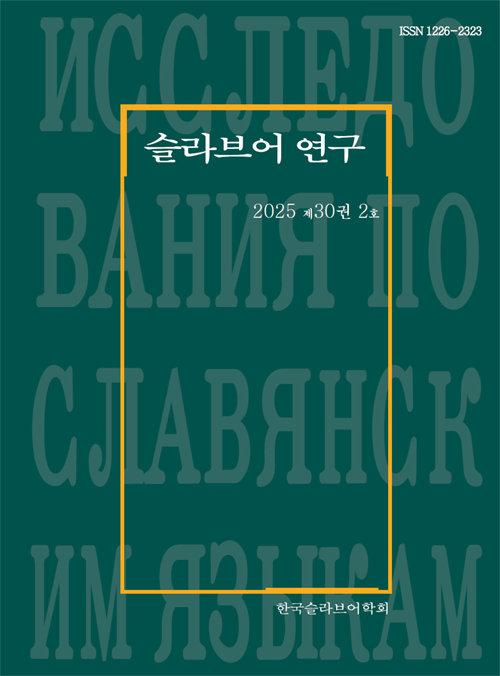- 영문명
- Study on Situation of the Russian diaspora and Russian language in the Post-Soviet Area
- 발행기관
- 한국슬라브어학회
- 저자명
- 정경택(Kyung-Taek Chung)
- 간행물 정보
- 『슬라브어 연구』제30권 제2호, 113~130쪽, 전체 18쪽
- 주제분류
- 인문학 > 기타인문학
- 파일형태
- 발행일자
- 2025.10.31
4,960원
구매일시로부터 72시간 이내에 다운로드 가능합니다.
이 학술논문 정보는 (주)교보문고와 각 발행기관 사이에 저작물 이용 계약이 체결된 것으로, 교보문고를 통해 제공되고 있습니다.

국문 초록
Conservation of Russian Diaspora, Russian language, and Russian culture, and, in the worst case, maintaining the status quo, were one of the main reasons for the conflict in newly independent countries during the dissolution of the Soviet Union.
Conflicts between the nation and the language base contributed to Moldova's declaration of independence, the establishment of the Gagauzia Autonomous Organization, and Ukraine's Republic of Crimea and the annexation of the Russian Federation, and the founding of the Donetsk and Lugansk People’s Republics.
After the dissolution of the Soviet Union, Russians participated in an organized ethnic minority against the central government of a new independent country, which was a common phenomenon characterizing the behavior of Russians, but during this struggle, Russian diaspora in the disputed region suffered severely economically.
Currently, Pridnestrov’e, Donetsk, and Lugansk People’s Republics are recognized by the Russian Federation but not internationally recognized, and in fact, in addition to Russians, they share difficulties and disapproval of existence with native Russian-speaking residents.
First, Kazakhstan in Central Asia maintains its status by defining Russian as an official language as the most Russianized federal republic during the Soviet Union, but gradually the Russian diaspora is reduced, the Russian language is reduced, and the Cyrillic Alphabet is in the process of converting to Latin.
Moldova, the Soviet Union's only Roman-speaking federal republic, was the first region to experience language-based disputes, with a large number of Russians living there, but in 1992, a dispute caused the Pridnestr Moldova Republic to declare independence from Moldova to protect Russian-speaking rights, and it is now a de facto independent country. Although one-third of the people of the republic are Russian and Russian is one of the three official languages, along with Moldovan and Ukrainian, Russian is actually the language of the country.
After the dissolution of the Soviet Union, the status of Russian has declined, the use of Russian in various areas of life is being minimized and excluded, but in northern Kazakhstan and Pridnestrov’e in Moldova, where Russians have lived for a long time or where there are many Russian diaspora who have opposed the language policies of indigenous peoples, Russian is again becoming one of the official languages or strengthening in education. However, Russia's Special Military Operation in February 2022 is certain to have a negative impact on the Russian diaspora and the Russian language.
영문 초록
목차
1. 서론
2. 본론
3. 결론
참고문헌
키워드
해당간행물 수록 논문
- 슬라브어 연구 제30권 제2호 목차
- 러시아어 콜로케이션 A+N의 어휘 의미-고정성 유형 분석 - 사전 및 코퍼스 자료를 중심으로
- 조어의미의 본질과 특성
- 화용화된 명령형 구문 ‘смотри(те) + не + Imp’의 경고 의미 분석
- 러시아어에서의 거절 화행 유형 연구: 간접 거절과 화행 부정의 화용적 함의
- Алгоритм ведения занятий РКИ с использованием русских паремий в корейской аудитории
- Slang vo výučbe slovenského jazyka ako cudzieho jazyka
- 러시아어와 영어 관용구의 체계적 의미 관계 고찰: 동의어와 반의어를 중심으로
- 러시아 미디어에서 생태적 담화의 수사 전략과 어휘-의미적 특성
- 포스트소비에트 공간에서의 러시아인 디아스포라와 러시아어의 상황연구
- 한강의 『채식주의자』 러시아어 번역본 번역 전략 연구 - 문학소통모델에 따른 문학번역 소통의 미학
- Виртуальная учебная экскурсия на уроках РКИ в корейской аудитории (уровни А2-В1)
- Náboženská komunikácia vojvodinských Slovákov
참고문헌
관련논문
인문학 > 기타인문학분야 BEST
더보기인문학 > 기타인문학분야 NEW
- 역사와 융합 제28호 목차
- 현행 간도 교육의 문제와 정상화를 향한 시론적 연구 - 예맥한인(濊貊韓人)의 생활세계를 반영할 수 있는 ‘한국사 교과서’의 서사 문제
- 관상학에서 심상의 귀납적 접근 시론(試論) - 바람직한 심상 관리를 위한 성음
최근 이용한 논문
교보eBook 첫 방문을 환영 합니다!

신규가입 혜택 지급이 완료 되었습니다.
바로 사용 가능한 교보e캐시 1,000원 (유효기간 7일)
지금 바로 교보eBook의 다양한 콘텐츠를 이용해 보세요!



